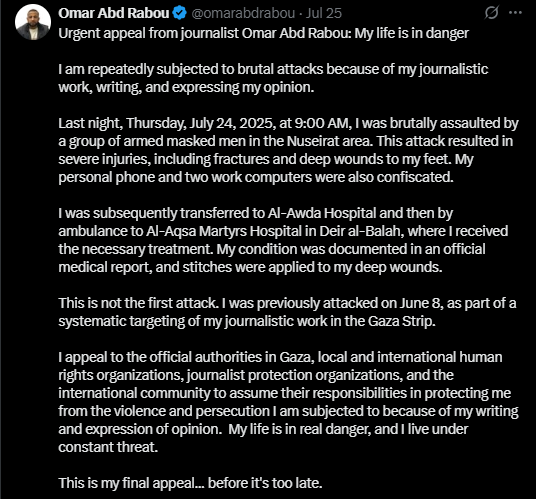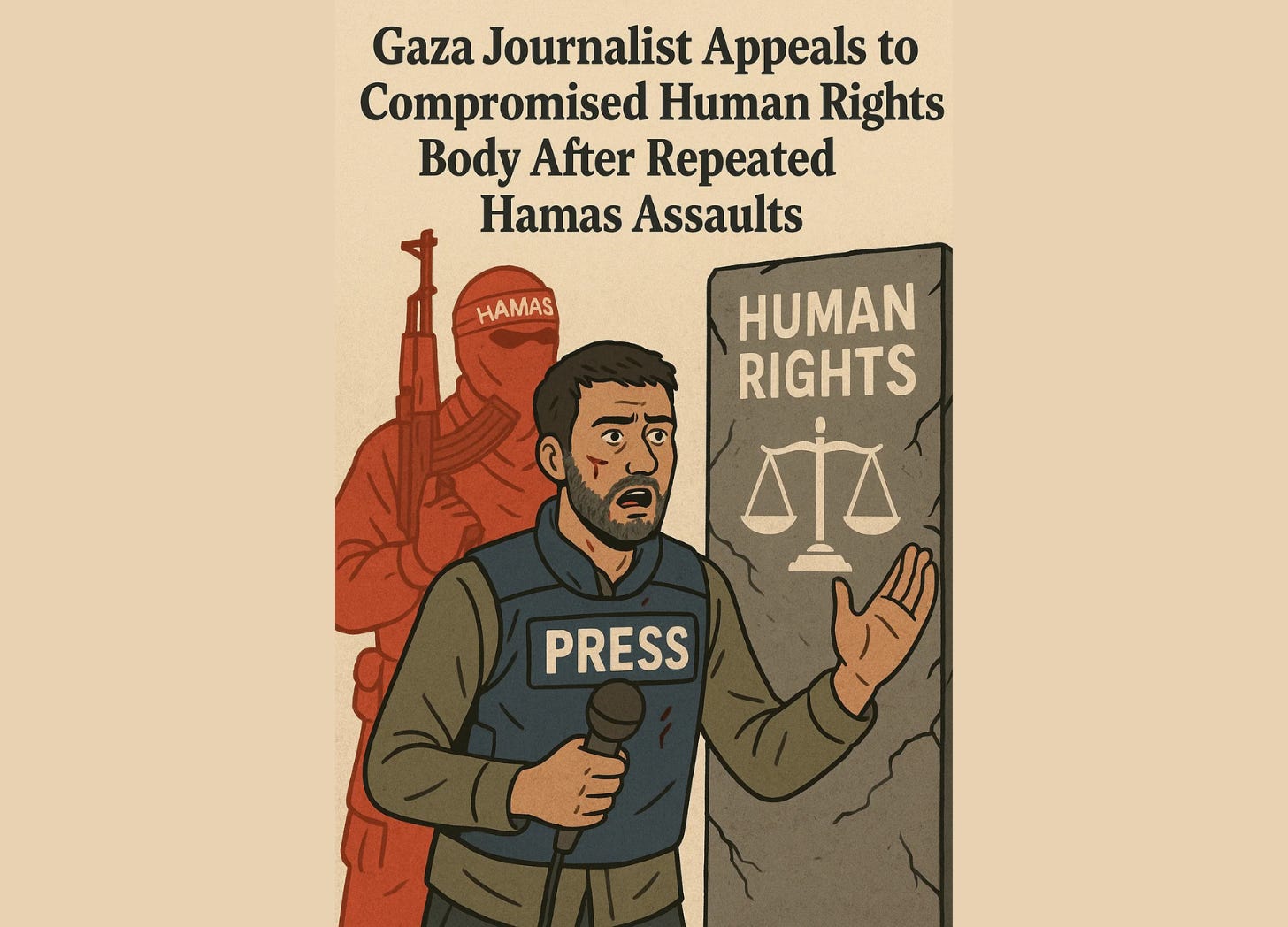Gaza Journalist Appeals to Gazan Human Rights Body After Repeated Hamas Assaults
Omar Abed Rabou's desperate plea to ICHR, which appears tied to Hamas, highlights both the personal dangers and institutional failures of reporting in Gaza
In a post on X, Gaza-based Palestinian journalist Omar Abed Rabou announced that he has filed a formal complaint with Gaza's Independent Commission for Human Rights (ICHR) following his second assault by Hamas. His case highlights ongoing tensions between press freedom advocates and Hamas's violence against journalists.
The attacks on Rabou occur within a broader context of intimidation of journalists by Hamas terrorists in Gaza if they are critical of the terror group. At the same time, Hamas' documented connections to the ICHR raise questions about the institution's ability to provide meaningful protection for journalists.
Documented Pattern of Violence
The 30-year-old journalist represents a growing number of Palestinian reporters facing escalating violence for their critical coverage of Hamas. Rabou's formal complaint documents attacks occurring on June 8, 2025, and again on July 23, 2025, with social media reports indicating the most recent assault required hospitalization after what witnesses describe as a coordinated attack by Hamas operatives.
"I am Omar Abdel Fattah Nazmi Abd Rabou," he states in his complaint, methodically detailing incidents where Hamas militias attacked him with iron rods, resulting in severe injuries that necessitated medical treatment. The attacks correlate directly with his journalistic output and political commentary, particularly his social media criticism of Hamas governance and calls for what he terms an end to Gaza's "black past."
The violence against Rabou follows established patterns identified by press freedom organizations. The Committee to Protect Journalists documented similar cases throughout 2024 and 2025, including correspondent Tawfiq Abu Jarad, who endured hours of beatings and interrogation by masked Hamas-affiliated assailants in Rafah after covering anti-government demonstrations.

The Compromised ICHR
Rabou's appeal to the ICHR for protection exposes fundamental structural problems within Gaza's human rights apparatus. The commission, established ostensibly as an independent watchdog, maintains extensive documented relationships with the same organization allegedly perpetrating the violence against journalists.
According to research by NGO Monitor, the ICHR has "regularly collaborated with and demonstrated support for EU, US, Canada, and Israel-designated terror groups, including Hamas." In August 2021, the commission hosted representatives from Hamas, the Popular Front for the Liberation of Palestine (PFLP), and Palestinian Islamic Jihad (PIJ) for panel discussions, legitimizing these organizations through official engagement.
The institutional capture extends to direct leadership contact. In December 2018, ICHR posted photographs from meetings between commission staff and Hamas Political Bureau head Ismail Haniyeh, with the Hamas insignia displayed in the meeting. Such imagery demonstrates the commission's inability to maintain independence from the very actors it should be monitoring.

Systematic Suppression of Palestinian Voices
The broader context surrounding Rabou's case reveals extensive suppression of Palestinian journalists by Hamas authorities. The Committee to Protect Journalists reports that "press freedom violations by Hamas during the war have been vastly underreported," with journalists facing "beatings, arrests, surveillance, and threats" that systematically "chill coverage" of events critical to public understanding.
Additional documented cases illustrate the scope of this suppression. Ibrahim Muhareb, a freelance photographer, suffered a beating that left him unconscious with serious head injuries. His attackers, identifying themselves as police investigators, told colleagues that "the spy and the journalist are one and the same," explicitly conflating journalism with espionage.
Mohammed Abu Aoun, a correspondent for Fatah-affiliated Awda TV, experienced similar violence while interviewing a woman critical of Hamas near Al-Aqsa Martyrs Hospital. Hamas's Internal Security Force beat Abu Aoun, searched his phone, and banned him from working in the hospital vicinity, demonstrating systematic territorial control over information gathering.
The Palestinian Journalists' Syndicate acknowledges documenting Hamas attacks on media internally without public disclosure "for fear of reprisals." This institutional fear creates a climate where violations occur with impunity, as even journalist advocacy organizations cannot safely publicize abuses.
Pervasive International Media Silence
Major international news organizations have largely failed to report on the documented pattern of Hamas violence against Palestinian journalists, despite extensive documentation by press freedom organizations. The Committee to Protect Journalists explicitly notes that "press freedom violations by Hamas during the war have been vastly underreported," indicating a systematic gap in international coverage rather than isolated oversights. As Jewish Onliner has previously reported:
"The assault on Omar Abed Rabou is the latest in a string of Hamas attacks on Palestinian journalists, yet the international press remains largely silent."
European and American news organizations that regularly cover press freedom issues in other conflict zones have shown limited interest in investigating Hamas's systematic intimidation campaigns against Palestinian reporters. This disparity suggests editorial decisions that prioritize certain narratives while marginalizing others, potentially influenced by political considerations rather than journalistic principles.
Reported Without Borders issued statements condemning Hamas threats, yet these failed to generate sustained coverage from major outlets. The lack of amplification means documented abuses remain confined to specialized publications rather than reaching broader awareness.
Desperate Appeals for International Intervention
Confronting both physical violence and institutional abandonment, Rabou has increasingly turned to international platforms to document his situation and request assistance. His social media posts reflect growing desperation as local protection mechanisms prove ineffective and international attention remains limited.

The journalist's appeals extend beyond personal protection to encompass broader concerns about press freedom in Gaza. His documentation of attacks serves not only as evidence for potential legal proceedings but as testimony to systematic suppression that affects all journalists operating under Hamas authority.



